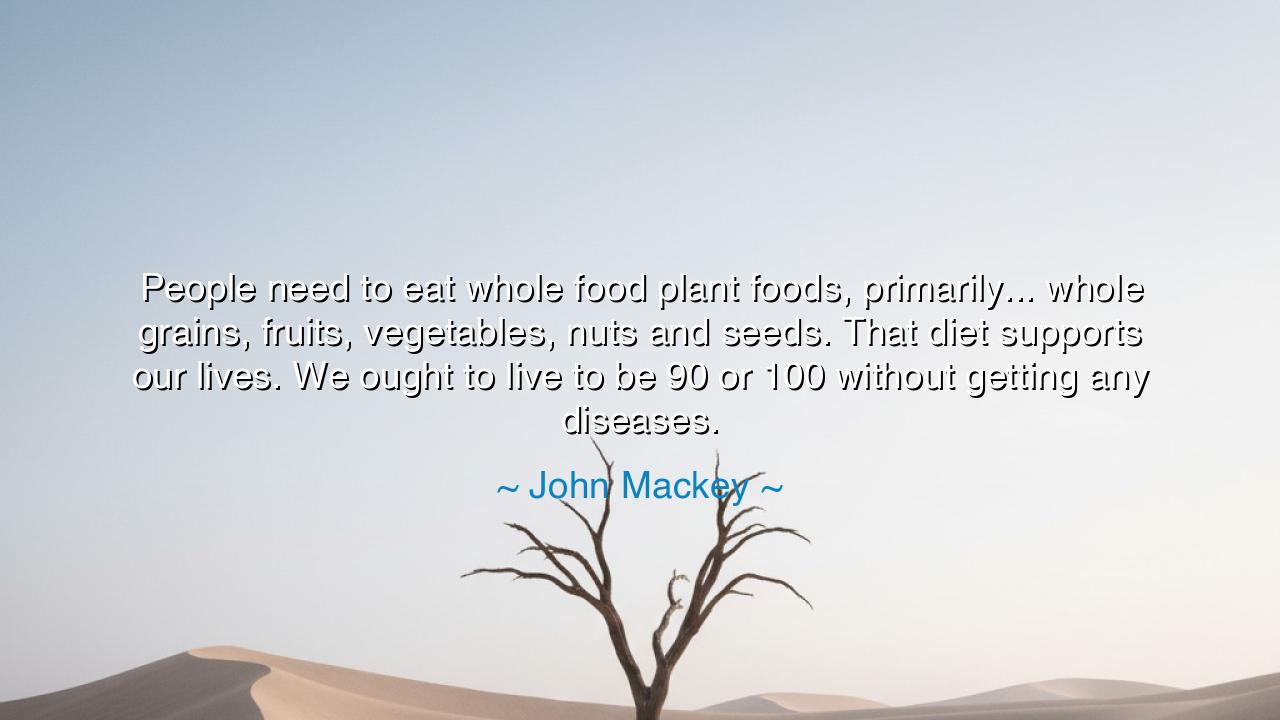
People need to eat whole food plant foods, primarily... whole
People need to eat whole food plant foods, primarily... whole grains, fruits, vegetables, nuts and seeds. That diet supports our lives. We ought to live to be 90 or 100 without getting any diseases.






The words “People need to eat whole food plant foods, primarily... whole grains, fruits, vegetables, nuts and seeds. That diet supports our lives. We ought to live to be 90 or 100 without getting any diseases” by John Mackey carry the serene power of ancient wisdom cloaked in modern language. In this statement lies not only nutritional guidance, but a philosophy of harmony — a vision of humanity restored to its natural rhythm with the earth. Mackey, a voice for conscious living and the founder of a marketplace devoted to natural foods, speaks as one who has looked upon the chaos of modern consumption and remembered what our ancestors once knew: that the body thrives when it lives in truth with nature.
When Mackey urges us to return to “whole food plant foods,” he is not simply prescribing a diet — he is calling for a return to wholeness. The modern world has fractured its relationship with sustenance, transforming food from nourishment into commodity, from medicine into indulgence. We refine the grain until it is lifeless, we strip the seed of its oils, we trade the fruit for sugar. Yet in doing so, we rob ourselves of vitality. His appeal to whole foods is a reminder that the wisdom of the earth cannot be improved by man’s machinery. The seed, the nut, the leaf, the fruit — these are the earth’s original gifts, untouched, balanced, and alive. To eat them as they are is to align one’s body with the rhythm of creation itself.
The phrase “that diet supports our lives” holds within it a spiritual truth that transcends nutrition. To eat consciously is not only to feed the body, but to honor the sacred connection between humanity and the world that sustains it. In the ancient temples of Greece, food was often offered before it was eaten, for the wise understood that gratitude transforms consumption into communion. Likewise, in the Taoist traditions of the East, the sages taught that the energy of life — chi — flows most purely through the foods closest to nature. Mackey’s teaching, though born in the modern marketplace, arises from the same eternal current: that health is the natural reward of living gently upon the earth.
When he declares that we “ought to live to be 90 or 100 without getting any diseases,” he is not promising immortality, but reminding us that longevity is the birthright of balance. In ages past, before industry’s poisons and abundance’s excess, humanity lived by the seasons and drew its strength from the soil. The ancient Okinawans of Japan, whose diet was rooted in vegetables, tubers, and grains, lived long lives with calm minds and clear eyes. Similarly, the peasants of the Mediterranean, nourished by olive oil, lentils, and wild greens, thrived without the afflictions of modern life. Their bodies were strong not because of medicine, but because of simplicity. Mackey’s vision of health, then, is not a dream of science, but a return to wisdom — the understanding that disease arises where harmony is broken.
Yet there is humility in his message. To live such a life is not achieved through miracle or wealth, but through discipline and awareness. It asks of us patience — to cook our own meals, to know where our food comes from, to see eating not as an act of consumption but of reverence. The modern world moves too quickly for such stillness, and so we pay the price with our vitality. The cure is not in pills, but in practices: the simple rituals of the table, the slow meal, the gratitude for the harvest. In these acts lies not only the preservation of health, but the restoration of meaning.
The ancients would have understood this. The philosopher Epicurus, often misremembered as a lover of indulgence, actually preached moderation, simplicity, and joy found in a meal of bread, olives, and water. He knew that peace of body leads to peace of soul. Likewise, Mackey’s call for a diet of grains, fruits, vegetables, nuts, and seeds is not asceticism — it is liberation. It frees us from dependence on processed illusion, from the false pleasures that decay the spirit. It teaches that abundance, when aligned with nature, is not gluttony, but grace.
So, dear listener, take this teaching to heart: let your food be your harmony. Seek not complexity, but truth in what you eat. Choose the living foods that carry the essence of sun and soil, the nourishment that restores rather than drains. Honor your body as the vessel of your spirit — not with indulgence, but with mindfulness. For as John Mackey reminds us, the path to longevity and freedom from disease is not hidden in science’s secrets, but in nature’s simplicity. Eat with gratitude, live with balance, and the body, like the earth, will reward you with its quiet strength and enduring light.






AAdministratorAdministrator
Welcome, honored guests. Please leave a comment, we will respond soon